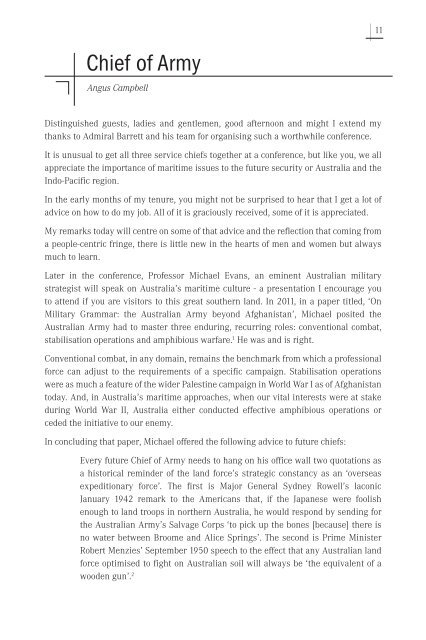THE FUTURE OF SEA POWER
SPC2015_Proceedings
SPC2015_Proceedings
Create successful ePaper yourself
Turn your PDF publications into a flip-book with our unique Google optimized e-Paper software.
Chief of Army<br />
Angus Campbell<br />
| 11<br />
Distinguished guests, ladies and gentlemen, good afternoon and might I extend my<br />
thanks to Admiral Barrett and his team for organising such a worthwhile conference.<br />
It is unusual to get all three service chiefs together at a conference, but like you, we all<br />
appreciate the importance of maritime issues to the future security or Australia and the<br />
Indo-Pacific region.<br />
In the early months of my tenure, you might not be surprised to hear that I get a lot of<br />
advice on how to do my job. All of it is graciously received, some of it is appreciated.<br />
My remarks today will centre on some of that advice and the reflection that coming from<br />
a people-centric fringe, there is little new in the hearts of men and women but always<br />
much to learn.<br />
Later in the conference, Professor Michael Evans, an eminent Australian military<br />
strategist will speak on Australia’s maritime culture - a presentation I encourage you<br />
to attend if you are visitors to this great southern land. In 2011, in a paper titled, ‘On<br />
Military Grammar: the Australian Army beyond Afghanistan’, Michael posited the<br />
Australian Army had to master three enduring, recurring roles: conventional combat,<br />
stabilisation operations and amphibious warfare. 1 He was and is right.<br />
Conventional combat, in any domain, remains the benchmark from which a professional<br />
force can adjust to the requirements of a specific campaign. Stabilisation operations<br />
were as much a feature of the wider Palestine campaign in World War I as of Afghanistan<br />
today. And, in Australia’s maritime approaches, when our vital interests were at stake<br />
during World War II, Australia either conducted effective amphibious operations or<br />
ceded the initiative to our enemy.<br />
In concluding that paper, Michael offered the following advice to future chiefs:<br />
Every future Chief of Army needs to hang on his office wall two quotations as<br />
a historical reminder of the land force’s strategic constancy as an ‘overseas<br />
expeditionary force’. The first is Major General Sydney Rowell’s laconic<br />
January 1942 remark to the Americans that, if the Japanese were foolish<br />
enough to land troops in northern Australia, he would respond by sending for<br />
the Australian Army’s Salvage Corps ‘to pick up the bones [because] there is<br />
no water between Broome and Alice Springs’. The second is Prime Minister<br />
Robert Menzies’ September 1950 speech to the effect that any Australian land<br />
force optimised to fight on Australian soil will always be ‘the equivalent of a<br />
wooden gun’. 2


